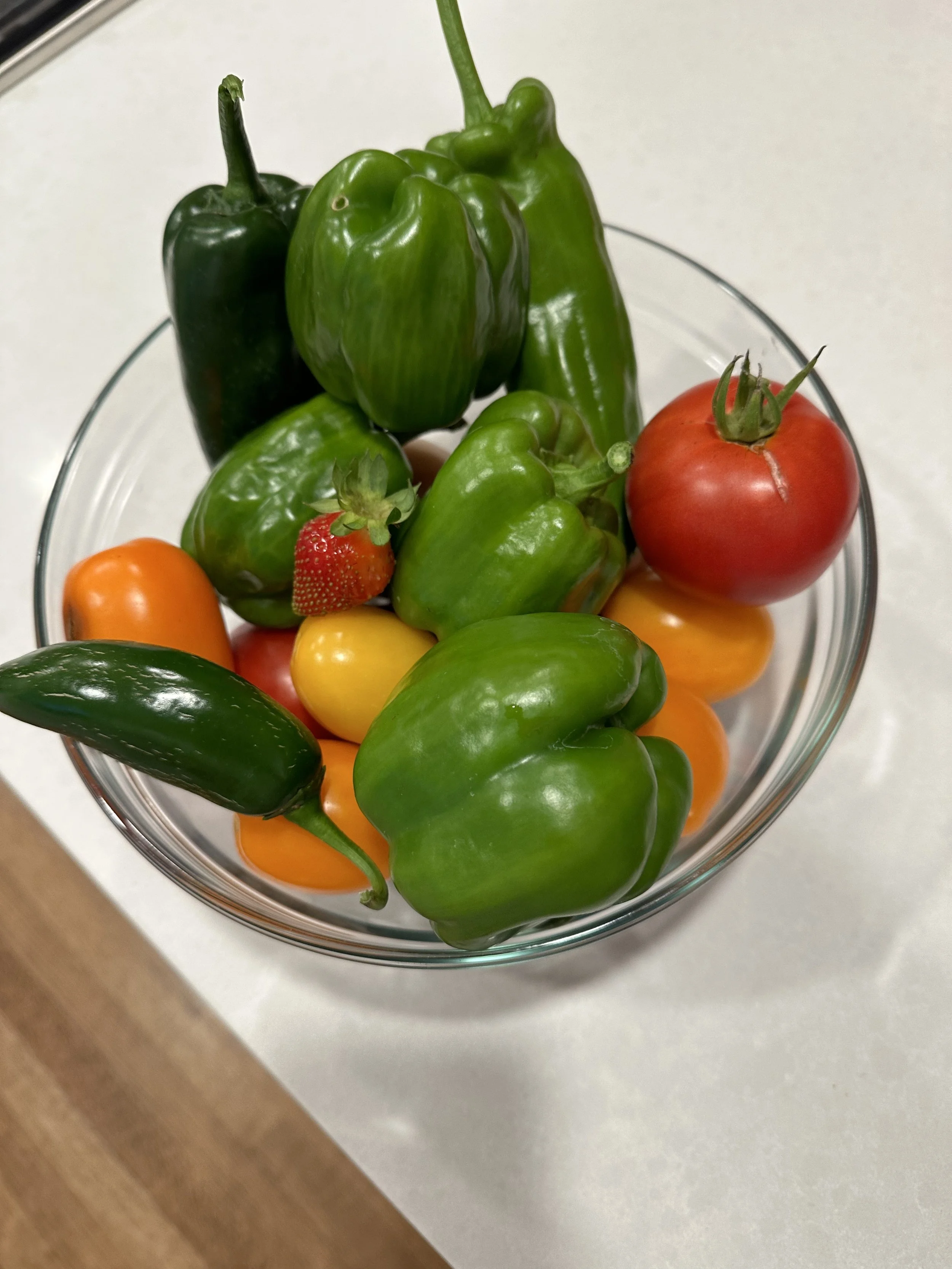Can You Compost Apple Cores? What to Do With Your Fall Fruit
We eat a lot of apples at our house - especially during the fall. With two young kids, I find myself with a surprising quantity of apple cores!
I'm always looking for ways to recycle or reuse materials when I can, so I try to compost food scraps as often as I can to make nutrient-rich soil for our garden. I often get questions like can you compost apples?
In this post, we'll dive into if an apple core is a biodegradable item and if you can toss all those apple cores from snack time in the compost bin.
What is Composting?
Composting is like nature’s way of recycling. You take organic matter like a banana peel or even whole apples and let them break down into rich, earthy goodness that’s perfect for your garden.
The key is to balance things like carbon-rich materials (think dry leaves) with green pieces like food scraps. Just make sure to keep out non-organic materials like plastic.
Whether you’re at home or out on a hiking trail, composting helps create healthier natural environments and supports the native species around us. I've noticed a huge difference in my garden since starting composting!
What Do You Need to Start Composting?
To start composting, you’ll need a few basic things. First, find a compost bin or designate a spot in your backyard. Then, gather organic materials like food scraps (banana peels, vegetable scraps), egg shells, and yard waste like dry leaves.
Balance is key—mix “green” materials, which are nitrogen-rich, with “brown” carbon-rich materials like leaves or paper. Keep the pile moist, but not too wet, and turn it regularly to help it break down. With a little patience, you’ll have rich compost for your garden!
Why Compost Apple Cores?
Apple cores are compostable materials that break down well in most composting processes. They are rich in essential nutrients like nitrogen, which plays a significant role in creating nutrient-rich compost.
By composting apple cores, along with other kitchen scraps like vegetable scraps, coffee grounds, and watermelon rinds, you're reducing your carbon footprint and creating a nutrient-rich environment for your garden soil, improving soil fertility, and reducing methane emissions from landfills.
Preparing Apple Cores for Composting
Before tossing apple cores into your compost bin, it's essential to prepare them properly. While you can compost the whole thing, chopping apple cores into smaller pieces or smaller chunks can speed up the decomposition process by increasing the surface area.
This step is particularly important in hot composting methods where high temperatures lead to efficient decomposition of small pieces.
Balancing Your Compost Pile
For successful composting, it's crucial to maintain a balanced compost pile. This means mixing green materials (like apple cores) with brown materials such as dry leaves, wood chips, and grass clippings.
Green materials provide nitrogen, while brown materials contribute carbon, creating the perfect balance for microbial activity that drives the composting process.
How to Compost Apple Cores
There are different methods to compost apple waste, so you'll want to choose the one that's best for you:
Cold Composting: This is a slower method but requires less effort. Simply add your apple cores, banana peels, and other kitchen waste to your compost heap, and nature will take care of the rest. Keep in mind that cold composting might take a year or more to break down apple cores fully.
Hot Composting: If you're looking for faster results, hot composting in a bin is the way to go. By maintaining high temperatures, this method speeds up the decomposition process. Regularly turning your compost pile and maintaining proper moisture content are key for efficient composting.
Vermicomposting: Involves using worms to break down compostable materials, including apple scraps. A worm bin is an excellent addition to your composting setup, particularly if you have limited outdoor space.
Anaerobic Composting: This method, where composting occurs in the absence of oxygen, is less common but still effective. However, anaerobic conditions can lead to methane emissions and bad odors, so it's essential to manage your composting bin properly.
Can You Compost Apple Seeds and Apple Peels?
Apple seeds are compostable, though some people worry about their cyanide content. Fortunately, the quantity of apple seeds in an average compost bin doesn't make enough cyanide to cause any concern. As for apple peels, they decompose quickly and contribute to the nutrient-rich soil that promotes plant growth.
Managing Moisture Levels
Proper moisture levels are crucial to maintaining the ideal environment for a healthy compost pile. Too much moisture can lead to excess moisture and foul odor, while too little can slow down the decomposition process.
Regularly check your compost heap to ensure it's as damp as a wrung-out sponge. If you notice any potential issues, like pest attraction or unpleasant odors, adjust the moisture content or add more brown materials.
The Environmental Impact of Composting Apple Cores
Composting apple cores is a natural behavior that aligns with environmental protection agency guidelines for reducing food waste. By turning your kitchen scraps into nutrient-rich compost, you're playing a significant role in enhancing soil health and structure, improving soil fertility, and supporting an organic garden.
Common Problems and How to Avoid Them
Even experienced composters face common problems like pest attraction or an imbalanced green-brown mix. To avoid these issues, ensure you're using the right balance of compost materials, maintain a green-brown mix, and monitor your compost pile for any signs of trouble.
FAQs About Composting
-
You should avoid composting meat, dairy products, and oils. These items can attract pests and create unpleasant odors in your compost pile, slowing down the decomposition process.
-
Yes, you can put whole apples in compost, but it’s better to chop them into smaller pieces. This increases the surface area, helping them break down faster and more efficiently in your compost pile.
-
An apple core can take anywhere from a few weeks to several months to compost, depending on factors like temperature, moisture, and how often the pile is turned. Hot composting will speed up this process
-
Most fruits can be composted, but citrus fruits and peels should be added in moderation. They can be too acidic and might slow down the composting process or harm the worms if you're using vermiculture.
-
Yes, banana peels are excellent for composting. They break down relatively quickly and add valuable nutrients like potassium and phosphorus to your compost.
-
Yes, eggshells are a great addition to compost. They add calcium, which helps with the structure of your soil. Just make sure to crush them first so they decompose more easily.
Final Thoughts
The next time you enjoy an apple pie or whip up some apple sauce, remember that composting apple cores is a great way to recycle organic waste. Whether you're adding them to a worm bin, backyard composting setup, or a traditional compost heap, these simple steps can lead to effective composting and a healthier environment. Plus, you'll be giving valuable nutrients to your garden soil, which is both good for your plants and supports soil structure.
For those composting for the first time, the process might seem daunting at first, but with practice and patience, you'll achieve the best results. And who knows, maybe this time next year, you'll be reaping the rewards of your efforts in the form of vibrant, thriving plants in your garden.
You might also like…
Hi, I’m Jen!
Hi, I’m Jen, your perpetually optimistic, fun-loving, witty friend. When I’m not working at The Marketing Greenhouse, you can find me gardening in the sun, playing games with my kids or creating content that inspires people to try new things and be the best version of themselves.













